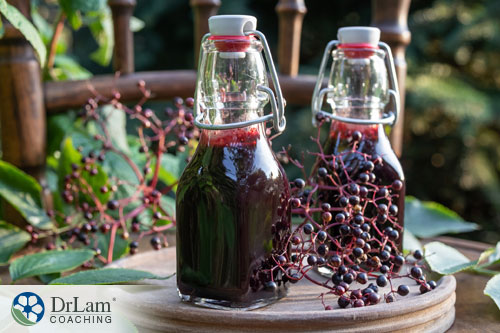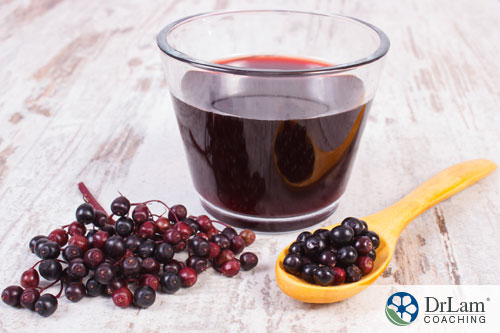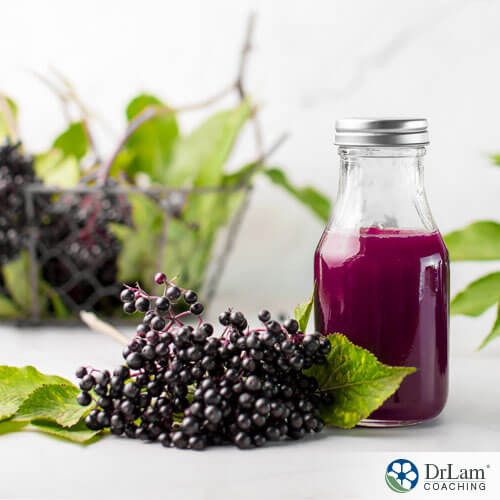 Elderberry has long been known as a cold and flu remedy. It has been used to strengthen the immune system and it offers many other health benefits as well. Elderberry is one of those ancient remedies that has been used in many different areas of the world. The tree, called Sambucus, is a large shrub with different parts that have different uses, such as the small white flowers and the deep black-purple berries.
Elderberry has long been known as a cold and flu remedy. It has been used to strengthen the immune system and it offers many other health benefits as well. Elderberry is one of those ancient remedies that has been used in many different areas of the world. The tree, called Sambucus, is a large shrub with different parts that have different uses, such as the small white flowers and the deep black-purple berries.
The berries can be used in many different ways. They can be made into crumbles, pies, syrups, sauces, jams, liqueurs, and chutneys. For the purpose of creating a handy immune-boosting remedy for your medicine cabinet, a syrup is the most convenient and useful recipe.
But elderberries can help with many different issues, not just fighting colds and flu. It can be especially helpful for many of the health problems associated with stress, adrenal fatigue, and your body’s stress response system.
Stress issues often first manifest in your adrenal glands which secrete cortisol, your main anti-stress hormone. When stress is chronic, your adrenals get overworked, and you may end up with Adrenal Fatigue Syndrome (AFS). Symptoms of AFS include fatigue, insomnia, weight gain, brain fog, anxiety, mild depression, hair loss, loss of libido, PMS, infertility, hypoglycemia, heart palpitations, food and drug sensitivities, salt and sugar cravings, and lowered immunity.
With lowered immunity, you become more susceptible to frequent colds, flu, infections, and other diseases, which can then add to the physical stress your body is undergoing, making AFS worse. Many of these symptoms occur because of dysregulations in your NeuroEndoMetabolic (NEM) Stress Response, which describes how organs throughout your body work together to handle stress, and how they can develop problems when something goes wrong.
Elderberries are one natural remedy that can help with many of the symptoms of stress and a dysregulated stress response, along with many other health conditions.
Elderberries contain an impressive array of vitamins, minerals, and many other important nutrients. They are rich in vitamins A, B6, and C, as well as potassium and iron. They also contain flavonoids, which are powerful antioxidants, as well as quercetin, anthocyanins, kaempferol, and phenolic acids.
This nutrient and antioxidant combination is what provides the health benefits of the elderberry and the remedies you can make from it.
You already know that vitamin C is the go-to vitamin when it comes to strengthening the immune system and fighting off infections, colds, and flu. But did you know that vitamin B6 is also an immune-boosting vitamin? It supports many of the immune system’s biochemical reactions. Also, elderberries contain anthocyanins, which are immune-stimulating chemical compounds.
You can use elderberry syrup, extracts, or supplements during cold and flu season, or when you’re about to take a long flight, to boost your immune system and help prevent infections.
But if you miss the opportunity to use elderberry for the prevention of colds, it can still be used to help relieve symptoms and speed up the recovery process. In a randomized study of 60 adults, the group that took 15 mL of elderberry syrup four times a day had their symptoms clear up four days earlier, on average, than the group that took a placebo. And other than colds and flu, this immune-stimulating property of elderberries can help stave off or remedy other infections, such as sinus infections.
But be careful if you have an autoimmune condition, however, as stimulating your immune system may aggravate your condition further.
Studies have found that elderberry extracts aid with glycogenesis, which is the process that takes glucose from the blood and transports it into muscle tissue and liver tissue, without the need for extra insulin.
 This is good news for those with high blood sugar levels, such as those with diabetes or prediabetes. Having high blood sugar levels over long periods of time increases the risk of damage to kidneys, eyes, nerves, and the cardiovascular system. It also interferes with hormone balance, fertility, and many other systems in the body. But please note that if you are taking diabetes medication, you should not use elderberries, or any natural remedies, unless otherwise told by your doctor.
This is good news for those with high blood sugar levels, such as those with diabetes or prediabetes. Having high blood sugar levels over long periods of time increases the risk of damage to kidneys, eyes, nerves, and the cardiovascular system. It also interferes with hormone balance, fertility, and many other systems in the body. But please note that if you are taking diabetes medication, you should not use elderberries, or any natural remedies, unless otherwise told by your doctor.
However, it’s important to note that the extracts used in these studies were alcohol-based, not sugary syrups. If you are interested in using elderberry for this purpose, it may be best to buy a commercial preparation without added sweetener.
If you have AFS, you’ll also need to be careful with any remedies that have an impact on blood sugar levels, since blood sugar levels in AFS can be quite erratic and sometimes tend towards hypoglycemia. People with AFS should usually avoid foods high on the glycemic index as they could spike blood sugar levels, prompting the pancreas to release a lot of insulin, which can then make blood sugar levels crash. So only use elderberry syrup if given the clear by your health professional.
Elderberries are rich in vitamin C and flavonoids, both of which are potent antioxidants. One cup of elderberries has about 52 mg of vitamin C. Antioxidants help neutralize free radicals and reduce oxidative stress, both of which are factors that can increase your risk for the development of chronic conditions, such as neurodegenerative diseases and cancer, as well as faster aging.
Chronic stress and adrenal fatigue can also be caused by oxidative stress, and most people with AFS have higher levels of oxidative stress and damage. One way to reduce the load is by ensuring enough antioxidants are available in your system, whether from food or supplements.
Vitamin C is especially important for those with AFS, since the adrenal glands have one of the highest concentrations of that vitamin in the body, and it’s a vitamin that is needed in order to produce cortisol.
Closely linked to their antioxidant activity, elderberries are also anti-inflammatory, probably due to their anthocyanins content.
Chronic inflammation is one of the root causes of most chronic health conditions, ranging from heart disease, to allergies, to skin problems. And it is a huge stressor on the body.
Inflammation is one of the top issues that you must tackle if you’re looking to manage any health issues you have, and it is not something you can medicate. To reduce or eliminate chronic inflammation, you have to change your diet and lifestyle, and natural remedies with anti-inflammatory properties can give you that extra push. Elderberries can be one of those natural remedies you can consider using as part of your regimen for fighting inflammation.
While cooked elderberries, or high-quality products made from them, such as extracts and ready-made syrups, are safe, raw elderberries, leaves, and stems contain toxins that can be poisonous and can cause nausea, vomiting, and diarrhea. Do not pick and eat elderberries, or allow your children to do so, unless you intend on preparing them at home in a proper way.
 Elderberry products in any form should not be used by pregnant or nursing mothers. And if you intend on giving a syrup or product to your children, make sure you get the okay from their pediatrician beforehand. Some people are sensitive or allergic to elderberries, so if you consume them and begin to experience allergy symptoms, discontinue use and seek medical attention. If you’re undergoing any major treatments or take medications, check with your doctor first if they are contraindicated with the use of elderberries.
Elderberry products in any form should not be used by pregnant or nursing mothers. And if you intend on giving a syrup or product to your children, make sure you get the okay from their pediatrician beforehand. Some people are sensitive or allergic to elderberries, so if you consume them and begin to experience allergy symptoms, discontinue use and seek medical attention. If you’re undergoing any major treatments or take medications, check with your doctor first if they are contraindicated with the use of elderberries.
To enjoy the benefits of elderberry, you can try this Elderberry Syrup Recipe.
The original recipe can be found here.
It can be difficult to find elderberries, whether dried, frozen, or fresh. They are often produced in Europe in the fall, and supplies tend to run out. However, there are also several commercial syrups or products made with elderberries, although the quality varies widely. Look for a product that has research verifying the efficacy of its specific preparation method. Sambucol is a good option.
Elderberries have important medicinal qualities. Extracts, syrups, tinctures, supplements, powders, pills, lozenges, sprays, ointments, teas, and infusions made with the flowers or berries can have medicinal properties, especially if used frequently. But make sure that you are using them safely if you choose to try them. Raw berries, leaves, stems, and roots can be poisonous. Elderberry can also bring about side-effects and can be contraindicated in certain cases, so it’s important to check with your doctor before trying it.
Though elderberries and elderflowers have been used medicinally for thousands of years, not many people today give them a try. But if you learn about their health benefits and give this elderberry syrup a try, you might end up coasting through this cold and flu season unscathed.
